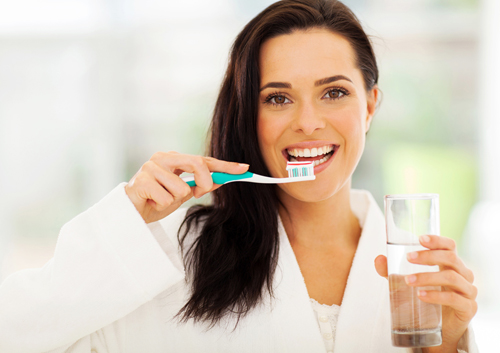Can You Repair Your Tooth Enamel?
January 29th, 2026

There are lots of ads out there for toothpastes that claim to repair damaged tooth enamel.
Can you treat cavities and tooth decay at home? Well, mostly, no, you can’t.
Can you strengthen your enamel at home? Very possibly—in some circumstances. Let us explain!
Cavities and tooth decay start forming when the enamel on the tooth’s surface breaks down. To discover what causes this breakdown, we need to see how chemistry works with our biology.
Tooth enamel is mainly made from calcium and phosphate ions. These minerals combine to form hydroxyapatite, crystals which make up around 95% of our enamel. Hydroxyapatite crystals are so strong that tooth enamel is the hardest part of our bodies. What can weaken a substance this strong?
Acids. Acidic foods and drinks, as well as acids created by the bacteria in plaque, strip away calcium and phosphate ions in enamel, weakening the surface of the tooth. This is a process called demineralization, and it’s the first stage of tooth decay. Left alone, weak spots will become bigger and deeper until they form cavities.
And tooth enamel, unlike the rest of your body, isn’t living tissue. It can’t regenerate. Once bacteria and acids have created a deep enough cavity, only Dr. Meuselbach can repair it by removing decay and filling the tooth.
Wait, this sounds a lot more like “No, you can’t repair your enamel” and much less like “It’s possible to strengthen your enamel.” But we’re not through!
Demineralization doesn’t equal cavities—yet. Careful attention to your habits and your diet can make a difference in whether your enamel continues to weaken or becomes stronger.
Our body’s first defense against demineralization is saliva. Calcium and phosphate ions in saliva bathe the teeth throughout the day, restoring the minerals which have been lost. This is called remineralization. Saliva also helps neutralize acids from the foods we eat. But with a diet heavy in acids, or a lot of plaque buildup, saliva just can’t keep up with the damage.
That’s where “enamel-repair” toothpastes come in. Toothpastes are available that contain hydroxyapatite to restore calcium and phosphates to weakened enamel. But for many of the most common enamel-repair toothpastes, the not-so-secret secret to their effectiveness is fluoride.
Dentists recommend fluoride toothpastes for several very good reasons. Fluoride is attracted to the minerals in tooth enamel and bonds with them. Once bonded, fluoride attracts the calcium and phosphate ions in saliva, helping restore lost minerals to the enamel. Even better, when fluoride bonds with the calcium and phosphate in our enamel, fluorapatite is created. This is a crystal even stronger and more acid-resistant than hydroxyapatite.
If you’re concerned about the strength of your enamel, and especially if you notice any signs of acidic erosion, talk to our West Chester dental team right away. Dr. Meuselbach can:
- Recommend over-the-counter toothpastes or professional fluoride applications to help reverse early demineralization
- Provide dental bonding, a crown, or a veneer to protect a tooth with serious erosion
- Treat a cavity caused by more advanced tooth decay.
Keeping your enamel healthy at home can take many forms. By careful brushing and flossing to remove plaque, by watching the acids in your diet, by making sure you’re properly hydrated, and by using fluoride toothpaste, you can both reduce the risk of demineralization and help restore weak spots in your tooth enamel.
So, can enamel-repair toothpastes effectively repair your teeth? Yes, they can be effective—if demineralization is in its early stages and if you make them a regular part of your daily dental routine.



